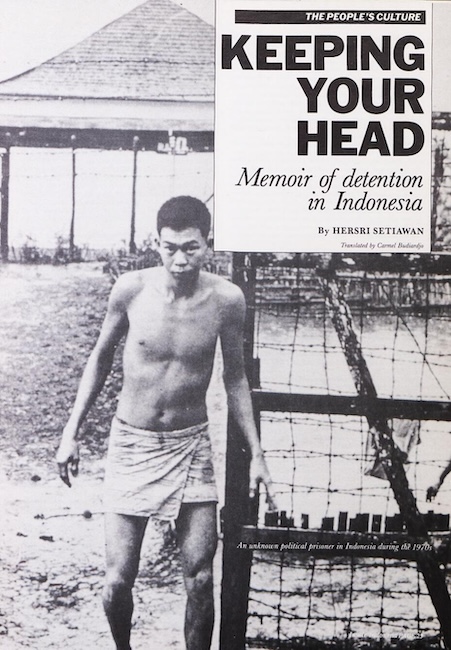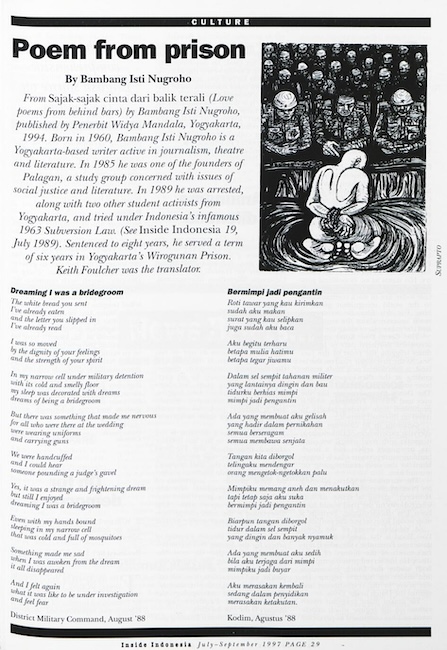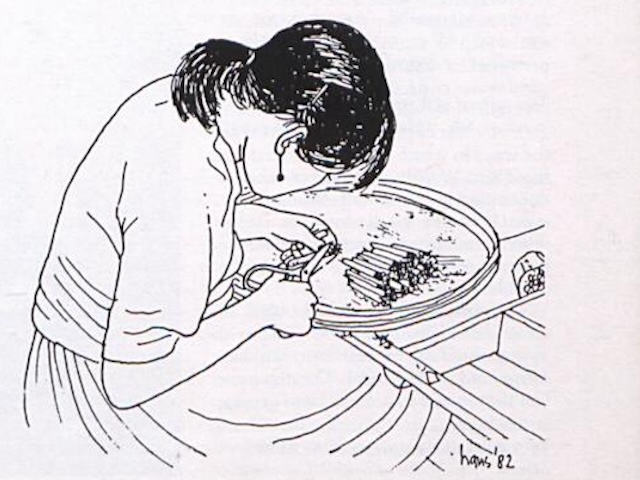Inside Indonesia and the People’s Culture
Keith Foulcher
When Inside Indonesia was launched in November 1983, the events of 1965/66 were still fresh in the Indonesian nation’s collective memory. The official interpretation of those events – that the Army had foiled an attempted coup by the Indonesian communist party (PKI) and its supporters, incarcerating tens of thousands of PKI members and sympathisers in the name of national security – was well-entrenched in the workings of state institutions and popular attitudes. Any challenge to this orthodoxy, including attempts to uncover the suppressed history of the widespread massacres that accompanied the Army’s rise to power, risked reprisals from an increasingly authoritarian state. Nevertheless, a lively climate of dissent continued to feature in Indonesian intellectual debate and expression in literature and the arts. It was given added impetus by the quietly assertive and courageous contributions of a cohort of ‘ex-tapols’, former political prisoners who had been ‘returned to society’ – if not unconditionally ‘released’ – in the period from 1976 to 1979, after sustained international pressure on the New Order government.
Many of these people, who had survived long years of intense suffering and deprivation of basic liberties with their visionary idealism still intact, were determined to resume their place as legitimate participants in national debates about Indonesia’s past, present and future. In alliance with younger generation critics of the regime, they sought out spaces for expression and strategies to protect themselves from state reaction and repression. Among these strategies was the backing of international recognition and support for the exercise of their right to freedom of expression. Media outlets outside Indonesia provided them with the ongoing platforms they could not rely on at home. There they found links to international supporters – journalists, academics, NGO and trade union activists – who were sympathetic to their cause and eager to make known news and views from ‘inside’ Indonesia that differed from those in the mainstream media of the time.
This was the climate in which Inside Indonesia and its mission were originally conceived. Under its founding editor, Max Lane, the magazine followed an explicitly activist agenda, describing itself as the ‘Bulletin of the Indonesian Resources and Information Programme (IRIP)’, and declaring in its opening editorial that it aimed to further people-to-people links between Australia and Indonesia. Endorsing the Hawke government’s expressed desire to have a ‘good working relationship with Indonesia’, Max Lane wrote: ‘IRIP hopes that its efforts will also contribute to the building of a “good working relationship” – BUT with the Indonesian people’. This concept of ‘the people’ was central. Every issue of the magazine featured a section entitled ‘The People’s Culture’, a direct translation of the pre-1965 left-wing catchphrase ‘Kebudajaan Rakjat’. It featured reports on developments in oppositionist arts and literature.
A quick survey of ‘The People’s Culture’ during Inside Indonesia’s first few years produces a roll-call of prominent names among the community of ex-tapols and their younger generation counterparts. The first three issues of the magazine featured translations of poems by Putu Oka Sukanta, a former member of the PKI’s cultural organisation who was released in 1976 after ten years’ political imprisonment. There were poems by Rendra, one of the regime’s most prominent critical voices in the arts. Also included was a reflection by ex-tapol Hersri Setiawan, published under the title ‘Keeping Your Head, An Indonesian Political Prisoner Remembers’ (October 1984).

By the mid-1980s, ‘The People’s Culture’ was giving prominent place to the regime’s most famous former prisoner of conscience, Pramoedya Ananta Toer. The regime banned his ground-breaking series of historical novels, which he originally composed as oral narratives to fellow prisoners in the Buru Island internment camp (December 1987). Reports on current developments included director Sjuman Djaja’s courageous exploration of class conflict in recent Indonesian films (December 1985) and poetry by the later ‘disappeared’ and presumed murdered worker-activist Wiji Thukul (October 1987).
Ordinary people
Yet alongside this list of well-known names in oppositionist literature and the arts, ‘The People’s Culture’ also remained faithful to its stated aim of giving voice to ordinary people whose creative endeavours were silenced by circumstances they faced in their own country. This aspect of Inside Indonesia’s contribution during these years is poignantly expressed in an introductory note to ‘Not That I Don’t Love’, a short story translated by Krishna Sen and published in the magazine’s fifth edition, March 1985:
‘This short story, written by an ex-political prisoner, has never been published in its original Indonesian version. We cannot disclose the author’s real name or the various pseudonyms under which she has been publishing since her release. A member of Gerwani, a women’s organisation with alleged connections with the Indonesian Communist Pary, banned since the so-called coup of September 1965, the author seems to have started writing fiction only after her detention. The experience colours much of her writing. Most of her short stories are about the down and out, the women whom poverty has driven to theft, begging and prostitution, the criminals (or were they the victims?) with whom the author shared her prison cells.’
Inside Indonesia can now reveal the author´s name. She was the journalist and women´s activist Sudjinah (1928-2007), already a freedom fighter in 1949.

The scope of these articles from Inside Indonesia’s first few years of publication sets the tone for the way ‘The People’s Culture’ reported on developments in Indonesian literature and the arts for the remainder of the New Order period. The tenth anniversary issue, published in September 1993, included an obituary for HR Bandaharo, a respected left-wing poet who had been a key member of the ex-tapol community in Jakarta. There was also an article on Basuki Resobowo, a prominent artist who lived out his life in exile in western Europe when his past political affiliations prevented his return home after 1965. And a moving poem by Bramantjo, a young generation oppositionist poet, titled ‘My Friend the Soldier’.
Change
It is only towards the end of the New Order that signs of change in Inside Indonesia’s orientation and mission begin to emerge. In September 1995, ‘The People’s Culture’ becomes ‘Culture’ for the first time. Both titles alternate over the following couple of years, and the concept of (the people's) culture begins to broaden. It encompasses ‘gay identities’ in March 1996, ‘punks, rastas and headbangers’ in October-December 1996, and ‘rock ‘n roll radicals’ in October-December 1997. A 'Poem from Prison' by the younger generation activist Bambang Isti Nugroho appeared in 1997, and the prominent writer and intellectual Goenawan Mohamad reported on the controversy that erupted when Pramoedya received a prestigious Magsaysay Award in 1995. But Goenawan’s article was, perhaps revealingly, entitled ‘Opening Old Wounds’. Indonesia was changing, and the silenced voices of 1983 were no longer confined to the shadows.
It was also not long before a change of generations was in the air. During the Reformasi years, two of Inside Indonesia’s most significant issues were firstly a special commemorative issue marking the death of Pramoedya Ananta Toer (October-December 2006) and then, only four years later, another special issue commemorating the life of Rendra (July-September 2010). Two of the great champions of ‘The People’s Culture’ had become a part of history. Inside Indonesia had played a role in bringing them and their work to the attention of an Australian, and international, audience. History had been made, and Inside Indonesia was there.
Keith Foulcher (foulcher@bigpond.net.au) was a regular contributor of articles and translations to Inside Indonesia between 1983 and 2010.












